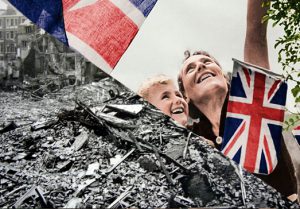
The psychoanalyst Vamik Volkan talks of “chosen traumas” and “chosen glories”, as stories from the past get retold and shape collective identity.
The trouble is that how the events are remembered changes. The stories seem to be about the past, but also have a present-day purpose. At the celebrations of the bicentenary of the French Revolution, Margaret Thatcher pointed out that we had had a revolution a century earlier: she was quoting history, but also making a point about how she understood Anglo-French relations now.
My sense is that the two world wars are acting as chosen traumas — articulating a sense of the struggle — and as chosen glories, speaking of our success.
But the wars are remembered differently on the two sides of the Channel. Though things were tough, we didn’t experience invasion, fighting in our streets, occupation or brutal repression.
The films and stories I remember from childhood gave the impression that we defeated the Germans on our own, grossly understimating the contribution of our allies. In fact, most of what I remember gave the impression that England won, fuelling an “England against the world” mentality which might well have contributed to the reasons for Scotland voting differently in the referendum.
At the very least this overlooks the huge amount the English and the Germans have in common, going right back to the fact that “England” is a German word and the Anglo Saxons were Germanic tribes. It’s appealing to think of Nazism as a German vice we bravely resisted, but Mosley’s Black Shirts, admiration for Hitler (at least early on) and widespread anti-semitism at the time suggest we could have gone down the facist route more easily than we like to think.
In psychoanalytic terms it’s sometimes useful to think of feelings that are around being acted out by a minority. If the feelings are in some way unacceptable, a great way of dealing with the feelings is to then attack the minority. I think there were some nasty things in the European consciousness in the 1930s. Hitler wasn’t a great leader: he was a nasty man who acted as a lightening conductor for those feelings.
When people talk of the EU as the “fourth reich” they are invoking that chosen trauma. It puts some of our unacceptable vices into the driving seat:
- wanting to make the UK a great trading nation and a world power independent of the EU sounds like a desire for us to dominate;
- worry about “ever closer union” forget that nations are either drifting apart, which is the path towards war, or coming closer together.
The chosen glory of “plucky Britain/England making a stand” mobilises some unattractive feelings — and globalisation means it is a grandiosity that can only end badly.
Talking about an actual trauma tends to bring back the memories painfully. Talking about a chosen trauma down-plays the actual suffering. How many people talking about the Blitz have a sense of what it was actually like? Is this the fantasy people are engaging when they suggest Brexit might be a bit tough to begin with but we will get through it?
There’s a very dangerous cocktail when stories of the past are recycled to tell us to stand pluckily independent, and to down-play the cost of that.
Right now we might need to re-visit the stories told of the war to recognise the contributions of our allies, and the sufferings of the Germans under the Nazis. The actual narrative, which goes back to Churchill and the “United States of Europe” and the Schuman Declaration, is of countering facism by standing together in freedom and stability. As globalisation has its effect, this is becoming more important than ever.
Fantastic article, Mark. I have long thought that there is some group pathology around the amount we refer back to WWII in the UK. Perhaps something around the guilt of Empire and concealing the reality of the way Britain was anything but a plucky underdog as an imperial power. It is definitely over-simplified in the nation’s narrative and appears to be a way for Britain to feel good about itself.